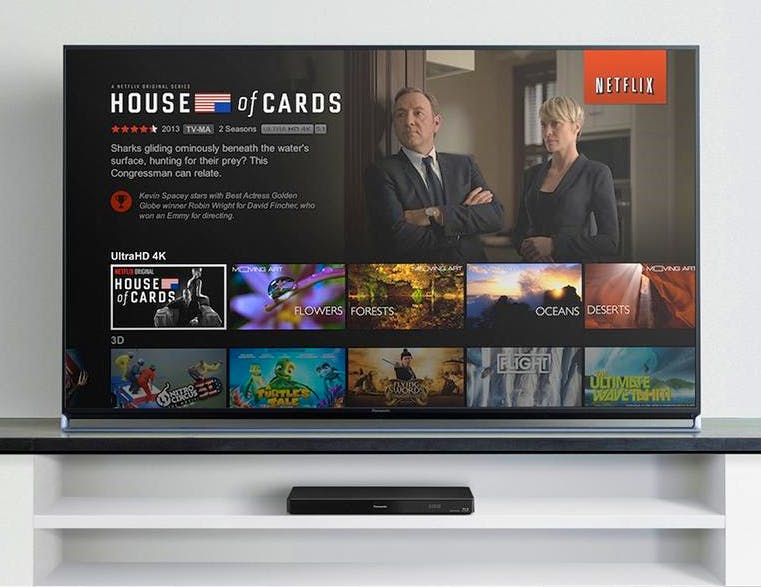What is 4K & Ultra HD? Everything you need to know
Confused about 4K and Ultra HD? Here's everything you need to know.

What is 4K?
Often used interchangeably with the term Ultra HD, 4K refers to a resolution of 3840px2160p. It's four times better than the 1920p×1080p of Full HD and so is able to provide you with a hugely improved picture featuring vivid, vibrant colours and plenty of rich detail.
What is the difference between 4K and Ultra HD?
Although the vast majority of electronic goods retailers and reviewers will describe 4K's resolution as being 3840x2160p, it actually stands at 4096x2160p.
True 4K, as it's sometimes known, was specifically designed to be used on digital cinema screens in order to give the audience the best possible visual experience. As even the big available TVs don't come close to reaching that kind of size, 4K had to be shrunk down to 3840x2160p (or Ultra HD) so it could be properly displayed on TV's 16:9 aspect ratio.
The difference between the two specifications is so slight that you'll find it virtually impossible to tell them apart however, hence why the two terms are used conversely, so don't worry about experiencing any kind of drop in picture quality.
What do I need to watch 4K?
In order to enjoy 4K content you'll need a specific 4K TV, a fairly strong internet connection and a source of 4K content.
There's quite a variety of sources to choose from when it comes to enjoying 4K content so which one you go for is really up to you but a few examples include streaming devices like a Google Chromecast Ultra or a 4K enabled set top box.
The best broadband speed for 4K streaming
4K is quite a data heavy format so you'll require both a reliably steady and relatively speedy home internet connection.
The download speed needed to start enjoying 4K content does vary from service to service but it's a good idea to have around 25Mbps to 30Mbps in order to keep everything running smoothly.
For both Netflix and Amazon Prime Video for example, you'll need a download speed of 25Mbps but to receive the 4K content featured on Sky Q you'll only need a spare 18Mbps.
How much are 4K TVs?
At the cheaper end of the scale, a 4K TV is likely to cost you anywhere from £300 to £500 even from premium brands like LG and Sony. The size of screen will be around 40 to 50 inches and they'll all feature access to Freeview, catch-up and streaming services like Netflix and BBC iPlayer. Some will also be smart TVs so you'll have access to a speedy web browser and a well-stocked app store.
Obviously, the bigger the TV is and the more features you start to add the more expensive it's going to get. From £600 up to £1000 for example, you're likely to get a smart 4K TV around 49 to 55 inches, access to all the excellent extras noted above and UHD upscaling so all your old SD and HD content will look fantastic.
The very top end 4K TV's can easily go for upwards of £2000 and are packed with all kinds of incredible features to reflect this huge price tag. A staggering screen size of 50 to 77 inches, 4K HDR, Dolby Atmos sound for a fully immersive experience and a built-in streaming device.
Who provides 4K content?
Sky and BT are the only big UK providers who currently offer their customers access to 4K content. Although Virgin Media does offer a 4K enabled set top box they strangely don't actually have any 4K content available for you to watch either via a download or on-demand.
Others like the BBC are reportedly working on making their own content available in 4K especially after a small clip of David Attenborough's new Planet Earth II was successfully trialled in UHD earlier this year.
There are a number of different subscription-based streaming services which provide 4K content and mostly all of them are accessible through apps on your TV.
As 4K continues to grow in popularity so to do Ultra HD Blu-Rays with a huge mix of great new titles including La La Land, Logan, T2 Trainspotting and Kong: Skull Island and classic older films now being released in the format. You'll also need an Ultra HD Blu-Ray player in order to enjoy them but for any serious film fan, it's a must have buy.
4K streaming services
Streaming giant Netflix and Amazon Prime Video both offer a great selection of 4K content including political drama House of Cards, Orange is the New Black, the Wachowski's huge scale sci-fi epic Sense8, the excellent TV adaptation of Philip K Dick's Man in the High Castle and Mozart in the Jungle respectively.
Available on Samsung, Sony and Vizio 4K TVs via an app is UltraFlix which claims to be the world's largest library of 4K content with over 600 hours of film, TV shows and documentaries. Unlike Netflix and Amazon, you can either buy the title outright or rent them for a 48-hour period.
A smaller selection of 4K films (but not TV show) are available to buy individually through both Google's Play Store. Unfortunately, it isn't available as an app on 4K TVs but can still be enjoyed via streaming with a Google Chromecast Ultra.
4K resolution vs 1080p
HD sits at a resolution of 1920×1080 meaning it's able to pack a little over two million pixels into a single space. 4K's resolution however, sits quite a bit higher at 3840x2160 which equates to just over eight million pixels squeezed into the exactly same space.
The extra pixels enable an incredible amount more detail to be included in your TV's picture so everything will look so much smoother and sharper with an absolutely dazzling colour palette thanks to vivid HDR and a considerably wider colour gamut.
Some experts argue that in order to really appreciate the benefit of 4K's many extra pixels you need to be sat a particular distance away from your TV. It's an idea that's still up for debate, but could prove problematic depending on the size of your home.
If it's something you feel like you'd like to incorporate into your potential 4K TV purchase there's plenty of resources, like a distance calculator for example, available online to help you figure out the correct viewing distance for your own 4K set.
4K-ready set-top boxes
Sky's 2TB Sky Q and BT Ultra HD Youview set top boxes both enable you to receive 4K content on your TV. While Sky Q offers a much wider range of film and TV shows, BT is definitely the one to with if you're a sports fan as they offer BT Sport 4K Ultra HD, the only channel of its kind in the UK where you can enjoy all kind of exciting sporting action.
Elsewhere, the Nvidia Shield, Amazon Fire TV and Q-Box 4K offer an alternative route to 4K content which doesn't involve taking out a pricey TV contract. All of them offer access to a wide number of 4K enabled streaming service along with game and a wide range of other new and lifestyle app.
So, is 4K worth it?
4K is undeniably a visually stunning format but it do have it problem. Price could be a big factor for some as a complete 4K set-up don't always come cheap and you've al got to think about whether your broadband is capable of handling it.
There is a decent amount of 4K content currently on offer, whether you go for streaming service or a TV provider like Sky, and with the growing popularity of the format that library is only to in so it's definitely a solid way to start future-proofing your home.
Ultimately, it really come down to your personal situation. There's more than enough here to make it worthwhile buy if you're able to afford it but it's not something that's completely essential yet. You could still hold off if you really wanted too.
















